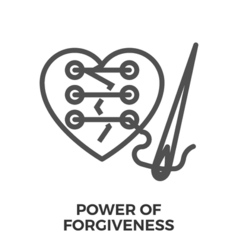If you’re in a blended family, it means you’ve had past relationships that ended. More than likely, those endings left you with some level of pain. In order to move forward into a new relationship, it is essential to deal with and heal from that pain and the associated emotions that come with it like resentment or anger. You may never fully heal, but you can manage it and grow through it.
The best way to heal from this pain is via forgiveness. This will include you forgiving yourself and forgiving your ex, it may also include forgiving extended family, children, and your spouse’s ex. To clarify, forgiveness does not mean that you condone the actions that were done. It does not mean there should be no consequences for negative, unhealthy actions others did. What forgiveness means is that you let go of it. You let go of the feeling of wanting to get revenge or retribution. You let go of holding them in judgment, and allow them to be judged by the only true judge.
There is a saying that holding onto a grudge is like drinking poisoned water and expecting the other person to die from it. Inside your body, it creates stress, tension, bitterness, and anger. These will slowly poison you. Stress can cause a host of physical as well as emotional issues in your body. It can lead to physiological effects like weight gain and headaches. Life is stressful enough without piling it onto yourself through carrying unforgiveness. Bitterness and anger will drive people away from you, it will damage your friendships and other relationships in your future. It leaves you more alone than when you started.
God forgives you
The good news is that God has forgiven us all, for all of our sins. The perpetuation in Christian society is that God hates divorce. And this is true! But he doesn’t hate divorced people! The reason he hates divorce is because it causes pain. He hates things that separate us from Him and the life He wants for us. He designed us for connection and He designed marriage as the ultimate connection. When that relationship breaks for any reason, it makes Him sad.
So, while we likely made many mistakes in our lives that led to the breakdown of a previous marriage; we do not have to live weighted down by those mistakes. We can find freedom in our hearts and our spirits to heal and move on in our lives. Remarriage has the potential to be a great redemption story. Out of the ashes of our previous marriages, we can take the lessons we learned, build stronger second marriages, and live as an example of hope for others. And isn’t God’s story all about redemption?
Forgive Yourself
We need to stop punishing ourselves for any failures we had in our previous marriages. We punish ourselves by things like self-sabotage of good relationships, by seeking unhealthy coping mechanisms, by the words we speak to ourselves in our thoughts.
The end of my first marriage meant grief for me. I had to mourn the ideal I had of what my life and my family would be like. I had to mourn the future I had imagined for my children. I had to let go of what I thought I wanted and accept it would be different. Part of processing that grief meant looking at what I could have or should have done differently both before my marriage and during it. I had to look at the decisions I made and find the lesson in them. For me, it took time with a counselor to help process the emotions of the divorce itself, as well as going back and working on the wounds that existed prior. These prior wounds had directly led in many ways to some of the decisions I made in my life surrounding my marriage. Ideally, I would have worked on those before getting married. In fact, I should have worked on them before entering any significant romantic relationship.
I had to learn to forgive myself. I frequently tell myself that I did the best I could with the knowledge I had at the time. I still tell myself this as I make mistakes and learn better ways to parent, to do my job, and to be a spouse. Now I have the opportunity to be in a marriage as a healthier and more whole person, and so I am thankful for that.
We each need to extend our past selves that same grace and forgiveness. You did the best that you could at the time. Understand that you are not perfect, and that you are a work in progress, and that is ok. We are all figuring it out as we go. If you are struggling to let go of those mistakes and you continue to punish yourself, seek help. A counselor can help you find perspective and process your past. They can help you learn better ways to treat yourself, and better ways to interact with others for your future relationships. Forgiving yourself will give you great freedom for your future if you allow yourself to learn from your past and change your heart.
Forgive your ex
I made mistakes in my first marriage. So did my ex-spouse. While it is easy to get into point tallying and scoring up who messed up the most, in the end it serves nothing. It may feel good in the moment to point the finger, to place the burden of blame solely on the other person, but to what purpose? Even in situations of egregious abuse by one spouse to the other, even if all the blame is on the other person; where do you go from there?
Do you live in a state of victimhood? Many divorced people spend a lot of time bashing their exes, complaining to anyone who will listen about how they have been wronged by them. In all honesty, it is often a normal part of the process of moving on from an acrimonious divorce. Telling our story helps us deal with our emotions, and it was part of the process I did with my counselor. However, we cannot stay in that mentality. We should not seek to remain victims for the rest of our lives. That gives far too much power away.
How do we take that power back? Forgiveness. I want to reiterate, forgiveness does not mean that anything the other person did is ok. It does not mean I do not place clear boundaries to protect myself in the future. It does not mean there are no consequences for their behavior. Forgiveness actually doesn’t even have to happen verbally with that person. Forgiveness releases the anger you hold in your body, and it releases the power that person holds over you. It says that while they did a bad thing, it is not my job to hold them responsible for it.
In divorce with children, I’ve found forgiveness has to be frequent. Since we are still so tied to each other, there are many ways where I continue to feel wronged personally or on behalf of my children. I have had to choose to forgive again and again. It is hard. Right when I feel like I am in a good place and have moved through forgiveness, another offense happens. So I forgive, and forgive again. But I can feel when my heart gets hardened with unforgiveness, I feel it throughout my body. It affects every aspect of my life, and that is unfair to me and my family. I can only control what I do, and for my own sake, I choose to let go. Sometimes it takes a lot of wrestling with it, sometimes it takes some deep conversations to deal with my emotions, sometimes it takes months to deal with it. Whatever it takes, I must choose to give the responsibility away. There have been times that means involving an attorney to help decide how serious the perceived offense was. Other times, it has meant giving my ex to God to judge. If your children are in danger, that may mean involving other authorities to protect them. But ultimately, the judgment does not belong to you.
This is really, really difficult. We get that. If you have left an abusive situation or your spouse continues to manipulate or otherwise hurt you, we get it. Forgiveness should not minimize the pain you went through. You will still need to set and enforce boundaries with that person of acceptable behavior. Forgiveness is an act of self care. Love yourself enough to let go and forgive. If you’re finding it difficult to do, working with a counselor will help.
Forgiving others
As we move through divorce, remarriage, blending families, and life in general; there will be plenty of opportunities to forgive. Most certainly, there will be things in your new marriage that will mean having to forgive your new spouse. Additionally, as you deal with many of the effects of the end of their first marriage, you may need to do some retroactive forgiveness. By that I mean forgiving your spouse of their past. They, too, made mistakes in their previous marriage and life before you that may be still affecting your life now. In your heart, you must deal with these feelings and process through them. The final step of that will be forgiving your spouse of their past errors. Even if they happened before you knew each other. It will help you and your marriage.
We also may need to apply the same forgiveness that we have to give our exes to our spouse’s ex. You may need to forgive them for their past or current treatment of your spouse. You may need to forgive them of things they do regarding the children. You may need to forgive them of things they say or do to you. Think about how you feel when you think of your spouse’s ex. Do you feel resentment or anger? Do you feel bitterness or anxiety? Any of those feelings may be indicators of unforgiveness in you. Forgiving them may not fully heal all of those feelings, at least not immediately, but it will help you start the path to healing.
There may be other people that you need to forgive from your past or your ex’s past. Perhaps it is your ex-in-laws or former friends who chose your ex’s side. Maybe it is some people from your church or workplace. Sometimes, you have to forgive your own children and step-children! No matter who it is, the unforgiveness is not hurting them as much as it is hurting you. Love yourself enough to set yourself free from unforgiveness.



